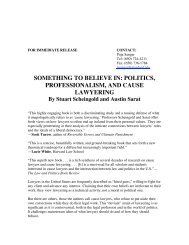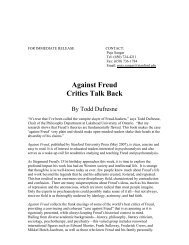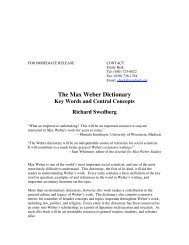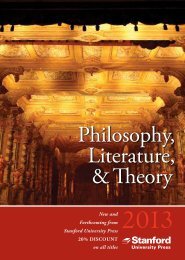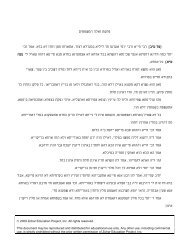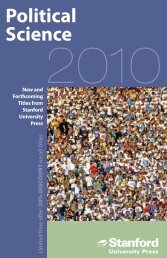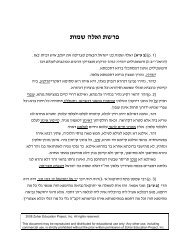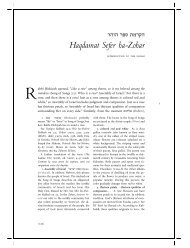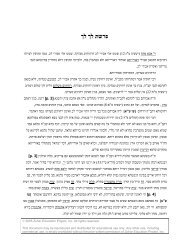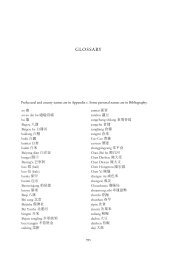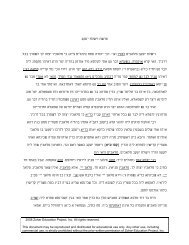Front Matter (PDF) - Stanford University Press
Front Matter (PDF) - Stanford University Press
Front Matter (PDF) - Stanford University Press
Create successful ePaper yourself
Turn your PDF publications into a flip-book with our unique Google optimized e-Paper software.
to manifest is Ḥesed, the grace or love of God. The emergence of God<br />
First<br />
hidingis an act ®lled with love, a promise of the endless showeringof<br />
from<br />
life on all beings, each of whose birth in a sense will continue this<br />
blessingand<br />
of emerging from the One. This gift of love is beyond measure and<br />
process<br />
limit, the boundless compassion of Keter now transposed into a love<br />
without<br />
each speci®c form and creature that is ever to emerge. This channel of<br />
for<br />
is the original divine shefa, the bounteous and unlimited love of God. But<br />
grace<br />
divine wisdom also understands that love alone is not the way to bring<br />
the<br />
``other'' beings and to allow them their place. Judaism has always known<br />
forth<br />
to embody judgment as well as love. The proper balance between these<br />
God<br />
ever the struggle of the rabbis themselves (loving the people as well as the<br />
two,<br />
is a struggle that Jewish sources have longseen as existingin God as well.<br />
law),<br />
therefore emerges linked to its own opposite, described both as Din, the<br />
Ḥesed<br />
of God, and Gevurah, the bastion of divine power. This is a force that<br />
judgment<br />
and limits love, that controls the ¯ow of Ḥesed in response to the<br />
measures<br />
abilities, and deserts of those who are to receive it.<br />
needs,<br />
represents the God of love, callingforth the response of love in the<br />
Ḥesed<br />
soul as well. Gevurah represents the God we humans fear, the One<br />
human<br />
whose power we stand in trembling. The kabbalists saw Ḥesed as the<br />
before<br />
of Abraham, described by the prophet as ``Abraham My lover'' (Isaiah<br />
faith<br />
Abraham, the ®rst of God's true earthly followers, stands parallel to<br />
41:8).<br />
the ®rst quality to emerge within God. He is the man of love, the one<br />
Ḥesed,<br />
will leave all behind and follow God across the deserts, willingto offer<br />
who<br />
even to place his beloved son upon the altar, for love of God. Gevu-<br />
everything,<br />
on the other hand, is the God called ``Fear of Isaac'' (Genesis 31:42). This is<br />
rah,<br />
divine face Isaac sees when bound to that altar, confrontingthe God he<br />
the<br />
is about to demand his life. Isaac's piety is of a different quality than<br />
believes<br />
father's. Tremblingobedience, rather than love, marks his path through<br />
his<br />
In the Zohar, the ``Fear of Isaac'' is sometimes depicted as a God of terror.<br />
life.<br />
linkingtogether of Ḥesed and Gevurah is an in®nitely delicate balance.<br />
The<br />
much love and there is no judgment, none of the moral demand that is so<br />
Too<br />
to the fabric of Judaism. But too much power or judgment is even<br />
essential<br />
The kabbalists see this aspect of the divine and human self as fraught<br />
worse.<br />
danger, the very birthplace of evil. Gevurah represents the ``left'' side of<br />
with<br />
divine as the se®rot emerge in humanlike form. The Zohar speaks of a<br />
the<br />
that arises on this ``left'' side of God. Gevurah becomes impatient<br />
discontent<br />
Ḥesed, unwillingto see judgment set aside in the name of love. Rather<br />
with<br />
permittinglove to ¯ow in measured ways, Gevurah seeks for some cosmic<br />
than<br />
to rule alone, to hold back the ¯ow of love. In this ``moment,'' divine<br />
moment<br />
turns to rage or fury; out of it all the forces of evil are born, darkness<br />
power<br />
from the light of God, a shadow of the divine universe that continues<br />
emerging<br />
exist throughout history, sustained by the evil wrought by humans below.<br />
to<br />
Introduction<br />
xlv<br />
Here we have one of the most important moral lessons of Kabbalah. Judgment



